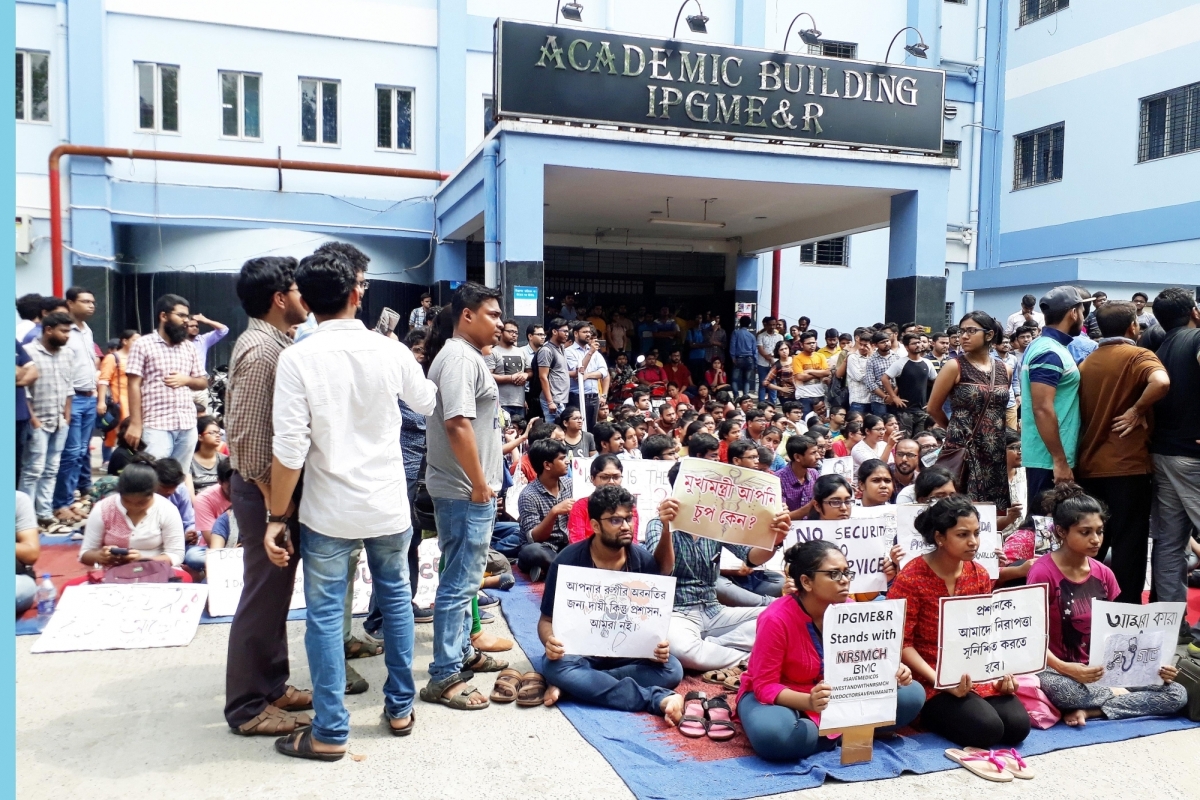CM inaugurates Infosys’s Kolkata Development Centre
Chief Minister Mamata Banerjee said on Wednesday that the setting up of the Kolkata Development Centre of Infosys will attract other IT leaders to invest in Bengal.
The meeting, which will decide the next course of action, will also be attended by representatives of other hospitals participating in the strike.

Junior doctors at the SSKM Hospital, who continue to be on strike for the fifth consecutive day, stage a demonstration against attacks on their colleagues and demand adequate security measures, in Kolkata on June 15, 2019. (Photo: IANS)
The strike by doctors in West Bengal entered the sixth day on Sunday leaving health services partially disrupted.
The impasse between the state government led by Chief Minister Mamata Banerjee and the doctors continued as the medicos, who are on a stir since Tuesday, looked forward to the General Body meeting to be held at the NRS Medical College and Hospital.
Advertisement
The meeting, which will decide the next course of action, will also be attended by representatives of other hospitals participating in the strike.
Advertisement
Agitating doctors had on Saturday evening turned down an invite for a closed-door meeting with Banerjee at Nabanna (the state secretariat), reiterating their request to the CM to visit them at NRS for an open discussion.
Addressing the media on Saturday evening, a spokesperson said that they are open for dialogue.
“If the chief minister extends one hand we will extend 10 of ours… we are eagerly waiting to break the deadlock,” the spokesperson said.
The spokesperson said that the doctors are eagerly waiting to start duty but there is “no such honest initiative to find a solution” from the Chief Minister’s side. The protesting doctors also said that none of their colleagues met Banerjee, as was claimed by the CM at her 6 pm press conference.
At her press conference, Banerjee urged the agitators to resume work and said her government has accepted all their demands.
She also said her government has not invoked the Essential Services Maintenance Act (ESMA) even after five days of the strike by the junior doctors.
“We have the laws, but we do not want to use them… We are not going to take any stringent action against any of the agitating junior doctors and hamper their career,” she said.
Over 300 doctors resigned till Saturday in protest of the attack on a young doctor at the NRS by relatives of a 75-year-old patient who died on Monday night. The family of the patient alleged of medical negligence.
The strike spread across the country as more doctors and hospitals either took out protest marches or came to work wearing helmets and other symbolic paraphernalia to express solidarity with the protesting doctors of NRS.
West Bengal Governor Keshari Nath Tripathi wrote to Banerjee advising her to take immediate steps to provide security to the doctors and asking her to take them into confidence.
Banerjee later said that she has spoken to the Governor and apprised him about the steps taken by the state government to resolve the impasse.
In its advisory, the MHA said it has received a number of representations from doctors, healthcare professionals and medical associations from different parts of the country for their safety and security in view of the strike in West Bengal.
Union Health Minister Harsh Vardhan asked states to consider enacting specific legislation for protecting doctors and medical professionals from any form of violence in the wake Bengal assault on junior doctors.
The opposition BJP, CPI-M and Congress in Bengal lashed out at Banerjee “for not being serious in resolving the impasses over doctor’s strike” and asked her to resolve the crisis.
(With inputs from agencies.)
Advertisement